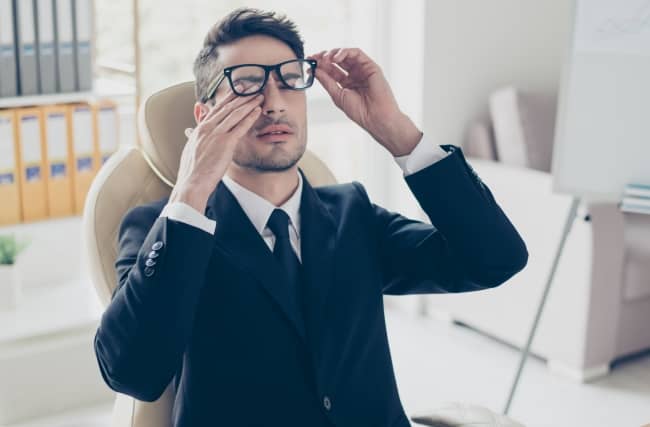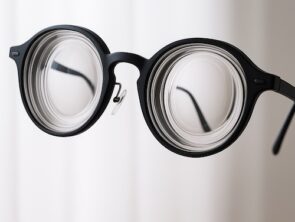“Can dry eyes cause headaches?” is something my patients ask me often. And yes, dry eyes and headaches may be related in some cases.

Since 2003, I’ve successfully treated many cases of dry eye and I enjoy seeing the relief my patients have experienced.
Here, I’ll explain the connection between dry eye and headaches, medications that may help, and what causes dry eyes so you can learn more about treating dry eye disease.
Key Takeaways:
- Dry eye disease is a common condition that can cause a variety of uncomfortable symptoms, including blurry vision, eye irritation, sensitivity to light, and possibly headaches
- Dry eye disease can be caused by a lack of water in the tears or a lack of oil in the tears
- Your optometrist can determine the underlying cause of your dry eyes and the best treatment
- Studies show a possible link between dry eyes and headaches but further research is needed to understand the complicated connection
- A variety of treatments and dry eye medications can help reduce discomfort and irritation
What Is Dry Eye?
Dry eye disease, also known as dry eye syndrome, is a condition that causes discomfort, irritation, and other symptoms. This common condition, affecting millions of Australians, is caused by a lack of lubrication in the eye.
This lack of lubrication can be a result of a lack of tears or tears that evaporate too quickly.
You May Also Like: Everything You Need to Know About Dry Eyes Symptoms and Causes
What Causes Dry Eyes?
Dry eye disease has two major causes, both involving the tear layer of the eye:
Aqueous Deficiency — The tear film is composed of mucus, oil, and water. In dry eye disease caused by aqueous deficiency, the eye does not produce enough water for the tears. This creates insufficient lubrication and discomfort.
.
Evaporative — Evaporative dry eye involves a lack of oil in the film. This allows the tears to evaporate too quickly, leaving the eyes feeling dry and uncomfortable.
Certain factors may increase your risk of dry eye disease, including:
- Being over age 50
- The use of certain eye drops, such as glaucoma drops or eye drops with certain preservatives (my patients are often surprised to find out that certain eye drops can make dry eye worse!)
- Having a medical condition that leads to eye inflammation, such as blepharitis
- Excessive exposure to dry air or wind
- Exposure to irritants such as smoke or perfumes
- Certain autoimmune conditions
- Certain medications, such as decongestants, antidepressants, or antihistamines
- Wearing contact lenses
- Prolonged exposure to screens
- Eye strain
- Allergies
- Nutritional deficiencies (particularly vitamin A)
- Recent eye surgery
- Clogged oil glands (Meibomian glands) in the eye
For a closer look at what causes dry eye syndrome, read my post here: Dry Eye Causes and Symptoms.
Click here to view our dry eye clinic.
What Is the Connection Between Dry Eye and Headaches?
Headaches and dry eyes can both be a result of a wide range of causes. Even if you experience dry eyes and a headache at the same time, it doesn’t necessarily mean one caused the other.
The exact link between headaches and dry eyes requires further research. However, some studies point to a link between dry eyes and headaches. This study found an association between migraine headaches and dry eye disease.
Other research suggests that individuals who experience migraines have a different eye structure than individuals who do not suffer from migraines.
Although dry eyes do not directly cause a headache, severe dry eyes can lead to eye strain and eye fatigue. This eye strain or fatigue may trigger a headache.
If you struggle with dry eyes and headaches, I suggest taking a look at when your headaches start. For instance, do you find that you experience the most headaches after a long work day in front of your computer screen? Or perhaps you get headaches after driving for long periods?
Working with an optometrist can help pinpoint the cause of your dry eye disease, examine lifestyle changes that may offer relief, and determine the ideal treatment or dry eye medication to get you the relief you need.
Treatments and Medications to Help Dry Eyes
Dry eye treatment will depend on the cause of your dry eye. An optometrist can pinpoint what is causing your dry eyes and the best treatment options.
Possible dry eye treatments and dry eye medications include:
Eye drops for dry eyes — Eye drops for dry eyes are one of the most common treatments, especially for mild cases. Lubricating eye drops can help relieve discomfort, irritation, and dryness. For chronic cases, I prioritise preservative-free formulas to ensure irritation is minimised.
Prescription dry eye spray — Your optometrist may prescribe you a dry eye spray to help lubricate your eyes and relieve discomfort. This option works similarly to eye drops for dry eyes.
Medication for dry eyes — More severe cases of dry eye may require prescription medication to help reduce inflammation and stimulate tear production.
Meibomian gland clearing — Clearing the oil glands of the eye may help in cases of evaporative dry eye.
Dry eye glasses — Your optometrist may fit you for dry eye glasses to help with symptoms.
Dry eye contact lenses — Specialty contact lenses may help in some cases of dry eye.
Diagnose and Treat Dry Eye with Our Caring Optometrists at E Eye Place
Dry eye disease and the uncomfortable symptoms that come along with it are not something you need to experience alone. Our knowledgeable, caring staff of optometrists at E Eye Place are here to support you and help you find dry eye relief. Book your appointment with me or another one of our leading optometrists in Perth today and we’ll find a dry eye treatment solution personalised to you.




